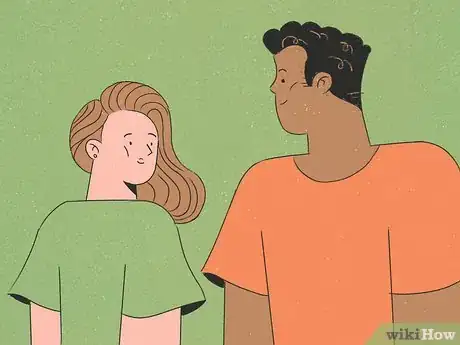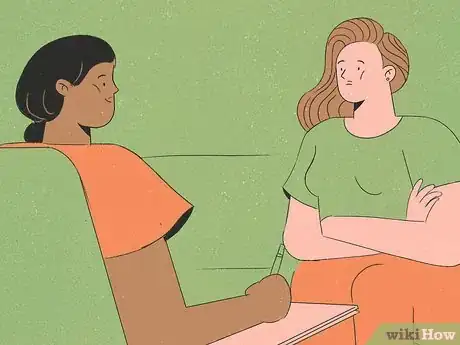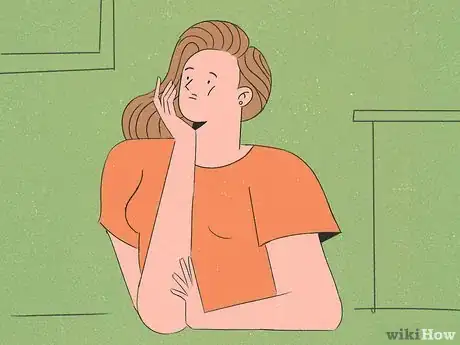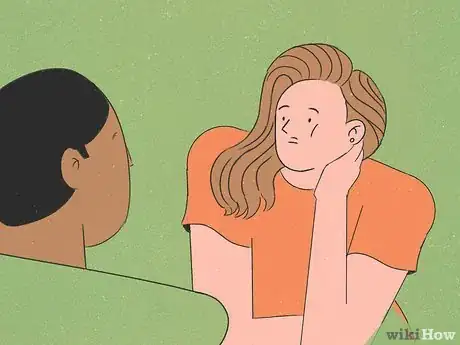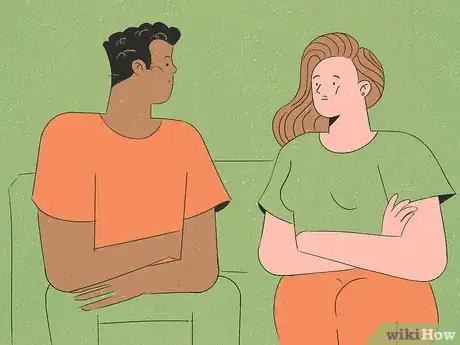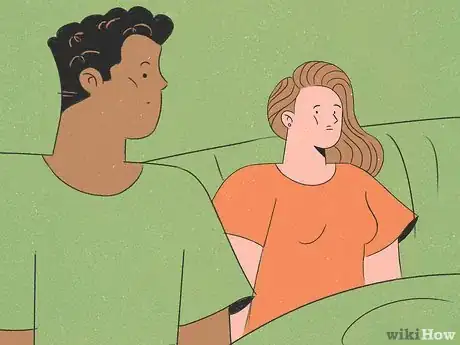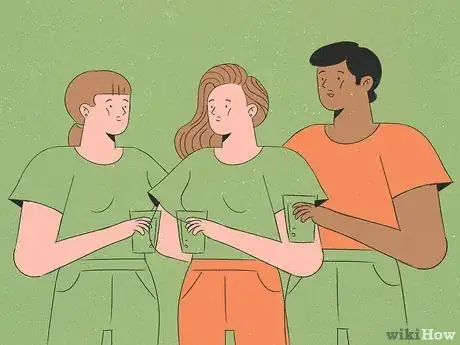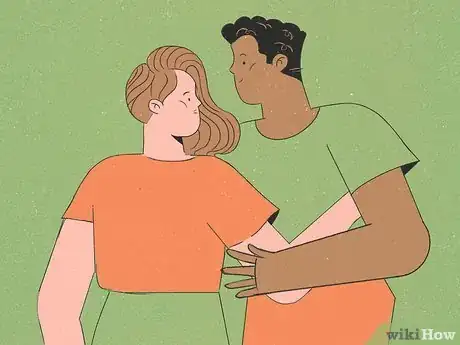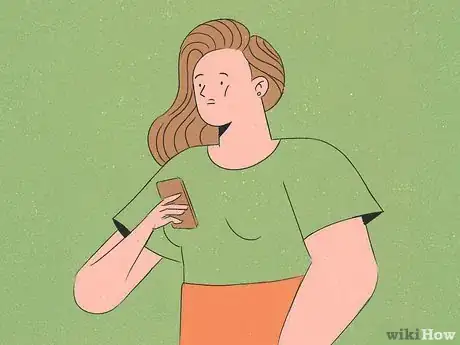This article was co-authored by Casey Lee and by wikiHow staff writer, Hannah Madden. Casey Lee is a Licensed Professional Counselor and Founder of Rooted Hearts Counseling LLC. With over a decade of experience, he specializes in facilitating growth and healing through co-creating safe and secure connections with couples. Casey holds an MA in Clinical Counseling from Columbia International University and is certified in Emotionally Focused Therapy (EFT) which he uses with all his couples. He is also a Level 2 Accelerated Experiential Dynamic Psychotherapist (AEDP) Therapist and a Level 1 trained Sensorimotor Psychotherapy Therapist. Casey is a member of the International Center for Excellence in Emotionally Focused Therapy, the National Board of Certified Counselors, and an affiliate member of the American Association of Marriage and Family Therapy.
There are 10 references cited in this article, which can be found at the bottom of the page.
This article has been viewed 13,247 times.
Many of us have dreamed of falling in love with our soulmates and riding off into the sunset. But when you experience a bad breakup or relationship trauma, finding that loving feeling again can seem near impossible. Fortunately, by figuring out where your hesitancy comes from, you can work through your emotions and open yourself up to love again.
Steps
Past relationships
-
If you had a bad experience in the past, you might feel a little scared. Maybe your partner broke up with you unexpectedly, or maybe they weren’t faithful like you thought they were. Looking for love after a deep hurt like this can be tough, and you may have to give yourself some time to heal before you jump back into the dating world.[1] X Research source
- Practicing self-care and leaning on your support system is a great way to heal from a breakup.
Fear of the future
-
You might be worried about if (or when) your new relationship ends. When you meet someone new, you’re never sure if it’s going to end in happiness or in heartbreak. That fear of the unknown can be very scary, and it can cause you to block yourself off emotionally from your partner. It can take some time to get over this fear, but don’t worry—it can be done.[2] X Research source
- A great way to move past this block is to simply accept that some things are out of your control. Once you stop trying to dictate everything in your life, you may feel more open to a relationship with an unknown future.
Fear of commitment
-
Maybe you’re afraid of committing to one person for too long. Having a fear of commitment doesn’t mean you don’t (or can’t) love your partner, but it does make it much harder to put a label on you as a couple. You may be afraid of commitment because you’re afraid of being hurt or betrayed, but you also may have a fear of commitment simply because you don’t want to settle down yet.[3] X Research source
- If you think your fear stems from past relationship trauma, it’s worth talking to a mental health professional about it.
- If you’re just not ready to commit to a relationship yet, consider taking a break from dating for the time being.
Past trauma
-
What happened to you in childhood can affect you today. Even if it’s been years and years, if you were hurt as a child, it can make you put up walls that are hard to break down. Our old dynamics can affect how we view the world today, and it can make us shy away from intimacy because it stirs up old, negative feelings. Things like being abandoned or neglected can really affect us, even as adults.[4] X Trustworthy Source HelpGuide Nonprofit organization dedicated to providing free, evidence-based mental health and wellness resources. Go to source
- Working through past trauma on your own can be hard. You may want to make an appointment with a mental health professional to work through your issues and open yourself up again.
Fear of sadness
-
If you’ve been through a breakup before, you might be scared of feeling sad again. If you’ve experienced that before (like so many of us have), you’re probably not too keen to repeat it. Unfortunately, blocking yourself off from love because you’re scared of getting your heart broken can make you lonely in the long run. It’s better to accept that there’s a chance this all might end in heartbreak rather than closing yourself off for good.[5] X Research source
- Think about how you first felt when you got your heart broken vs. now. Remember that it’s entirely possible to heal from a heartbreak, even though it doesn’t feel like it in the moment.
Fear of intimacy
-
Opening yourself up to a new partner can be scary. This is especially true if you were in a long-term relationship before, or if you haven’t dated much in the past. It can be frightening to open yourself up to someone new, but it’s really the best way to see if you two are a match. Instead of pushing someone away, try to break down your walls and reveal another part of yourself to your partner. Over time, it will get much easier.[6] X Research source
Low self-esteem
-
Our brains can trick us into thinking we aren’t good enough for someone else. Low confidence can stem from a lot of areas of life, but most often, it comes from what we were told during childhood. You can combat these thoughts and improve your self esteem by challenging them and asking yourself if they’re true. Then, you can repeat a positive thought about yourself like a mantra or write them down in a list to look back on.[7] X Trustworthy Source National Health Service (UK) Public healthcare system of the UK Go to source
- For example, if you catch yourself thinking, “Nobody cares about me,” ask yourself, “Is that true? Didn’t my friend just tell me how awesome I was last week?”
- Then, write down something positive about yourself, like, “I’m a great cook,” or, “I’m a kind friend.”
Unavailable partners
-
You may jump into relationships with an emotionally unavailable partner. This isn’t your fault—some people simply have a habit of falling for people who aren’t quite right for them. If you’re finding it hard to fall in love with new partners because you can’t connect with them, check in with yourself and see if you’re falling into a pattern of jumping into relationships that you know won’t work.[8] X Research source
- Breaking this cycle can be hard to do on your own, so experts recommend talking to a mental health professional about it.
Codependency
-
You may be worried about falling into the trap of being taken advantage of. If you’re worried about this, you might have experienced relationships where you gave it your all. On the other hand, your partner probably didn’t pay much attention to you or reciprocate your efforts, all while complaining about everything you did. This is called a codependent relationship, and it can cause a lot of trauma that affects our ability to love. If you think you were in a codependent relationship, try talking to a mental health professional to work through those feelings.[9] X Research source
- Often, codependent relationships have one partner who is addicted to a substance.
Fear of losing yourself
-
You might have a past of pouring yourself into relationships. While it’s fine to be excited about a new partner and want to spend a lot of time with them, it can become a problem when you forget who you were when you were single. This fear of becoming someone new once you enter a relationship can be hard to get over, but definitely not impossible. Make time to do things that you like to do, and consider taking your next relationship very slowly.[10] X Research source
- Be sure to hang out with your friends and keep doing your hobbies as you start dating again. If you feel yourself ignoring friends or fun activities for your partner, take a step back and remind yourself that you’re your own person.
Attachment issues
-
Being too attached or too unattached can make it tough to trust someone. If you have an anxious attachment style, you might feel like you need to be with your partner constantly or else they’ll leave you. If you have an ambivalent attachment style, you might hold your partner at arm’s length so they can’t get close to you. Usually, these attachment styles stem from experiences during childhood, so you can work through them with a mental health professional if you’d like to.[11] X Trustworthy Source HelpGuide Nonprofit organization dedicated to providing free, evidence-based mental health and wellness resources. Go to source
- The goal is to get to a secure attachment style: when you feel confident in yourself and your relationship, and you and your partner are on equal footing emotionally.
Perfectionism
-
Perfectionists tend to reject partners who aren’t 100% right for them. If you find yourself ignoring potential partners because they don’t check all of your boxes, this might be your issue. It’s a pretty common thing nowadays, especially because of social media—we can get an insight into someone’s life before we even meet them. However, try to keep your judgements to yourself, and give potential romances a chance before writing them off.[12] X Research source
- This isn’t to say you can’t have standards! It’s totally fine to reject someone because they aren’t a match for you. However, make sure you get to know them first so you can give them a chance.
You Might Also Like
 11 Ways to Trigger the Hero Instinct
11 Ways to Trigger the Hero Instinct

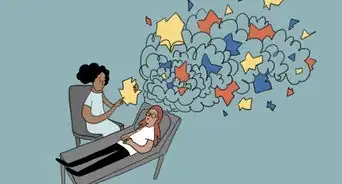

 13 Ways to Not Catch Feelings
13 Ways to Not Catch Feelings

 Here’s Why You Can’t Remember Your Childhood or Teenage Years
Here’s Why You Can’t Remember Your Childhood or Teenage Years

 Should You Talk to Your Crush After Being Rejected?
Should You Talk to Your Crush After Being Rejected?





References
- ↑ https://www.psychologytoday.com/us/blog/compassion-matters/201401/7-reasons-most-people-are-afraid-love
- ↑ https://www.psychologytoday.com/us/blog/compassion-matters/201401/7-reasons-most-people-are-afraid-love
- ↑ https://psychcentral.com/blog/fear-of-commitment-or-phobia#fear-isnt-always-a-phobia
- ↑ https://www.helpguide.org/articles/ptsd-trauma/coping-with-emotional-and-psychological-trauma.htm
- ↑ https://www.psychologytoday.com/us/blog/compassion-matters/201401/7-reasons-most-people-are-afraid-love
- ↑ https://albertellis.org/2014/04/dealing-with-your-partners-fear-of-intimacy/
- ↑ https://www.nhs.uk/mental-health/self-help/tips-and-support/raise-low-self-esteem/
- ↑ https://www.gottman.com/blog/how-to-avoid-the-pursuer-distancer-pattern-in-your-relationship/
- ↑ https://www.mhanational.org/co-dependency
About This Article


